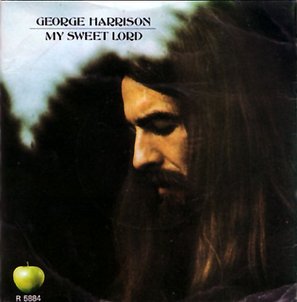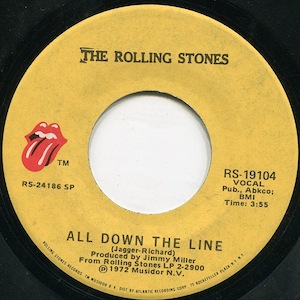
Chubby Checker is an American singer and dancer. He is widely known for popularizing many dance styles, including the Twist dance style, with his 1960 hit cover of Hank Ballard & The Midnighters' R&B song "The Twist", and the pony dance style with the 1961 cover of the song "Pony Time". His biggest UK hit, "Let's Twist Again", was released one year later ; that year, he also popularized the song "Limbo Rock", originally a previous-year instrumental hit by the Champs to which he added lyrics, and its trademark Limbo dance, as well as other dance styles such as The Fly. In September 2008, "The Twist" topped Billboard's list of the most popular singles to have appeared in the Hot 100 since its debut in 1960, an honor it maintained for an August 2013 update of the list.
Apple Records is a British record label founded by the Beatles in 1968 as a division of Apple Corps Ltd. It was initially intended as a creative outlet for the Beatles, both as a group and individually, plus a selection of other artists including Mary Hopkin, James Taylor, Badfinger and Billy Preston. In practice, the roster had become dominated by the mid-1970s with releases of the former Beatles as solo artists. Allen Klein managed the label from 1969 to 1973, then it was managed by Neil Aspinall on behalf of the Beatles and their heirs. Aspinall retired in 2007 and was replaced by Jeff Jones.

96 Tears is the debut studio album by the American garage rock band? and the Mysterians, released in 1966. It peaked at number 66 on Billboard's Pop Albums chart. The single "96 Tears" reached number 1 on the Billboard Hot 100 on October 29, prior to release of the album. The album and the single "96 Tears" were both on the charts for fifteen weeks, while the single "I Need Somebody" was on the charts for ten weeks.

Andrew Loog Oldham is an English record producer, talent manager, impresario and author. He was manager and producer of the Rolling Stones from 1963 to 1967, and was noted for his flamboyant style.

Apple Corps Limited is a multi-armed multimedia corporation founded in London in January 1968 by the members of The Beatles to replace their earlier company and to form a conglomerate. The name is a pun for its pronunciation "apple core". Its chief division is Apple Records, which was launched in the same year. Other divisions included Apple Electronics, Apple Films, Apple Publishing and Apple Retail, whose most notable venture was the short-lived Apple Boutique, on the corner of Baker Street and Paddington Street in central London. Apple's headquarters in the late 1960s was at the upper floors of 94 Baker Street, after that at 95 Wigmore Street, and subsequently at 3 Savile Row. The last of these addresses was also known as the Apple Building, which was home to the Apple studio.
Cameo-Parkway Records was the parent company of Cameo Records and Parkway Records, which were major American Philadelphia-based record labels from 1956 and 1958 to 1967. Among the types of music released were doo-wop, dance hits, popular/rock, rockabilly, big band, garage rock, soul and novelty records.

"My Sweet Lord" is a song by English musician George Harrison, released in November 1970 on his triple album All Things Must Pass. It was also released as a single, Harrison's first as a solo artist, and topped charts worldwide; it was the biggest-selling single of 1971 in the UK. In America and Britain, the song was the first number-one single by an ex-Beatle. Harrison originally gave the song to his fellow Apple Records artist Billy Preston to record; this version, which Harrison co-produced, appeared on Preston's Encouraging Words album in September 1970.

Allen Klein was an American businessman whose aggressive negotiation tactics affected industry standards for compensating recording artists. He founded ABKCO Music & Records Incorporated. Klein increased profits for his musician clients by negotiating new record company contracts. He first scored monetary and contractual gains for Buddy Knox and Jimmy Bowen, one-hit rockabillies of the late 1950s, then parlayed his early successes into a position managing Sam Cooke, and eventually managed the Beatles and the Rolling Stones simultaneously, along with many other artists, becoming one of the most powerful individuals in the music industry during his era.

"Bitter Sweet Symphony" is a song by the English rock band the Verve, released on 16 June 1997 by Hut Recordings and Virgin Records as the lead single from their third album, Urban Hymns (1997).
Terry Knight and the Pack was an American garage rock band formed in Flint, Michigan in 1965. The band was signed to the Lucky Eleven label through most of its brief recording career. They produced one national hit with their cover version of the song, "I ". Despite their inability to replicate their success, the band was a frequent attraction in the Michigan rock scene. The Pack was fronted by singer Terry Knight. In 1969 the group disbanded but two members, drummer/vocalist Don Brewer and guitarist Mark Farner, would go on to form another band, Grand Funk Railroad.
The Andrew Oldham Orchestra was a musical side project in the mid-1960s created by Andrew Loog Oldham, the original manager and record producer of the Rolling Stones. There was no actual orchestra per se. The name was applied to recordings made by Loog Oldham using a multitude of session musicians, including members of the Rolling Stones.
"Sweet Virginia" is a song written by Mick Jagger and Keith Richards, and was the sixth song on the Rolling Stones' 1972 double album Exile on Main St. The song is a slow country-inspired composition with a saxophone solo.
Peter Bennett was a popular music promoter who worked with several prominent artists including the Beatles, the Rolling Stones, Elvis Presley, Bob Dylan, Frank Sinatra and the Jackson 5.
"Sue Me, Sue You Blues" is a song written by English musician George Harrison, released on his 1973 album Living in the Material World. Harrison initially let American guitarist Jesse Ed Davis record it for the latter's Ululu album (1972), in gratitude to Davis for his participation in the Concert for Bangladesh. When writing the song, Harrison drew inspiration from the legal issues surrounding the Beatles during the early months of 1971, particularly the lawsuit that Paul McCartney initiated in an effort to dissolve the band's business partnership, Apple Corps.

"Stop Breaking Down" or "Stop Breakin' Down Blues" is a Delta blues song recorded by Robert Johnson in 1937. An "upbeat boogie with a strong chorus line", the lyrics are partly based on Johnson's experience with certain women:

"All Down the Line" is a song by the English rock band the Rolling Stones, which is included on their 1972 album Exile on Main St.. Although at one point slated to be the lead single from the album, it was ultimately released as a single as the B-side of "Happy".

Hairspray: Original Motion Picture Soundtrack is a soundtrack of the 1988 John Waters film, Hairspray.
"Loving Cup" is a song by the Rolling Stones, which appears on their 1972 album Exile on Main St.

Ronald Schneider is best known for being the business presence at the center of pivotal 1960s events including the Altamont Free Concert, the dissolution of The Beatles and the reorganization of their business arm, Apple Corps. Schneider managed the early US tours of The Rolling Stones while simultaneously dealing with the financial affairs of some of the biggest names in Rock and Roll history including the Stones, The Beatles, Neil Sedaka, Sam Cooke, Nancy Wilson, Bobby Vinton, Herman’s Hermits and The Shirelles.

Michael "Mick" Gochanour is a Grammy Award-winning American film director, producer, composer, and entertainment executive. He is best known for his filmmaking and film restoration with The Rolling Stones, Alejandro Jodorowsky and Sam Cooke. As a sound designer, composer, and music supervisor, he specialized in nature videos for Turner Broadcast, World Wildlife Organization and the Discovery Channel. He has toured with such acts as Peter Gabriel and David Bowie, among others.












